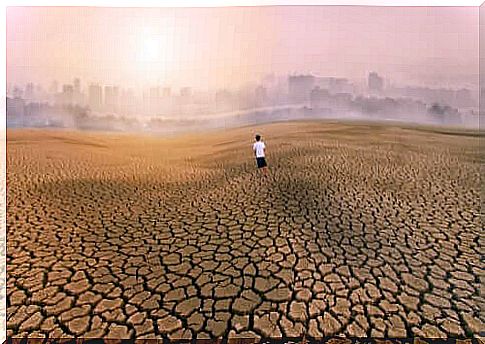Environmental Anxiety, A Consequence Of Climate Change

The climate crisis is real: Poles are melting and millions of species are threatened as humans continually change and destroy the world’s ecosystems. Thus, environmental anxiety is normal for those who actually care about it.
Furthermore, there are conflicts over the control of certain resources and concerns about scarcity. Worrying about this affects people in different ways, but it can go quite deep for some and greatly affect their lives. These people probably suffer from environmental anxiety.
This concept, also known as climate anxiety, stems from the need to put a name to the chronic fear of environmental damage. Concerns about climate change and the consequences for nature are definitely another source of stress that many add to their daily worries.

Two possible reasons why you may suffer from environmental anxiety
Environmental anxiety occurs for two reasons. On the one hand because one had to leave home. On the other hand, it can be a consequence of having such an developed environmental awareness that it leads to psychological discomfort.
It lost the country
According to a report published by the EU, around 26 million people are affected by meteorological disasters: floods, rain, fires or severe storms every year.
Thus, residents in certain areas are forced to emigrate due to the mentioned incidents. For example, one in ten people living on islands such as Tuvalu or Kiribati end up as climate refugees. Due to these environmental changes, natural or man-made, a large part of the biological diversity dies and certain places run out of resources.
Therefore, it is becoming increasingly difficult and even impossible to live in such areas. So much so that the UN estimates that around 1,500 million people have to move to survive.
In addition to the changes that people go through when they have to change their place of residence, those who are forced to emigrate also suffer from seeing land and the environment destroyed. This can lead to enormous concern and frustration.
Environmental anxiety is mainly due to high environmental awareness
People who are attached to and aware of nature become emotionally concerned. This often comes with a feeling of frustration due to the limited power of individual actions. Thus, some people really suffer from the effects that humans cause on the planet.
An example of this is the effect it has on young people. A clinical psychologist in Oxford believes that many young people have environmental concerns.
This is because children understand and are aware that people are responsible for these climate changes. Therefore, they end up with feelings like resentment towards adults, as they could have reduced the influence, frustration, fear and grief.
In the same way, it is striking how environmental researchers are also affected. In this connection, Joe Duggan launched a study for researchers in 2014. The goal was to make them respond to how climate change made them feel.
The results showed more of the same. Many of them felt hopeless, they were scared, despairing and worried. In fact, British researchers recently published a letter in the journal Science . In it, they asked for psychological help to better deal with the negative results of the studies.
Some consequences of environmental anxiety
There are many consequences of climate change in addition to environmental anxiety. With a focus on the psychological aspects, these variations can lead to physiological changes which in turn affect people’s well-being. Humans’ most basic physiological processes, such as sleeping or eating, are strongly influenced by nature.
Sunlight and temperature affect circadian rhythms and regulate, for example, neurotransmitters that affect health and mood. Therefore, radical changes in the environment compromise your body balance at all levels.
Natural disasters and high temperatures are also closely linked to mental disorders such as anxiety and mood disorders. For example, the rise in global temperatures is already having an impact on mental health.
Furthermore, research published in Nature reveals that this increase plays a major role in the suicide rate. Another study revealed that pessimism increases when the temperature soars.

What can you do?
It is in your power to perform these three simple actions to reduce the problem and discomfort:
- Think about climate change when deciding what to eat, how to travel, and what and where to shop.
- Talk about climate change with your friends. You may not be able to change the world, but raising awareness in your immediate group can make a big difference.
- Know what measures are being taken at the political level and what the parties involved are proposing, and vote accordingly.
Experts recommend promoting mechanisms for resilience when faced with this situation. (It will not change unless you act immediately.) In other words, you need to understand the problem as a multidimensional element.
Thus, the best measure to reduce environmental anxiety is to be well informed and authorized. Every person has an opportunity to be a part of the solution.









